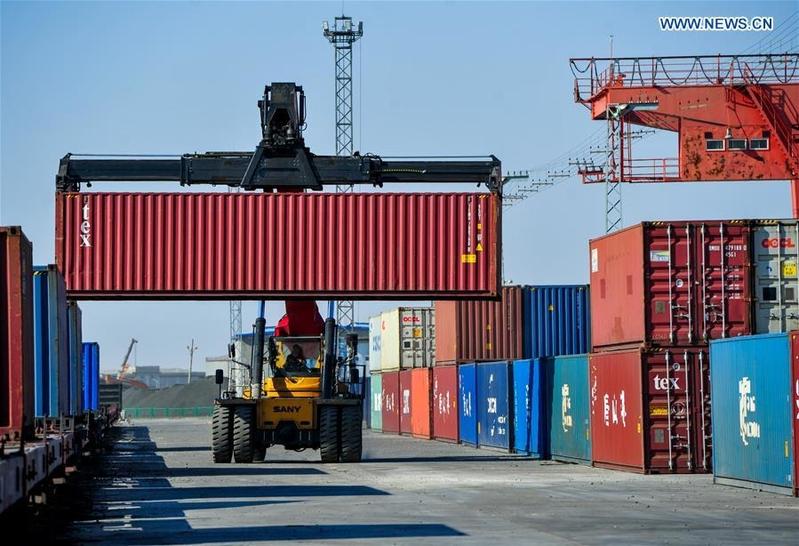 A crane loads containers at Erenhot Port in North China's Inner Mongolia autonomous region. (PHOTO / XINHUA)
A crane loads containers at Erenhot Port in North China's Inner Mongolia autonomous region. (PHOTO / XINHUA)
Closer economic and trade ties between China and European countries will benefit both sides and inject more positive factors into the global economy as it faces increasing recession threats, according to experts and business leaders.
Despite decoupling pressure from the United States, the European Union should join hands with China to strengthen bilateral trade and investment ties, as cooperation can help solve disputes, fuel growth and benefit the people, they said.
Their comments came after the visit by French President Emmanuel Macron to China had sent a series of positive signals in the regard.
READ MORE: Xi calls for mutual trust in talks with French, EU leaders
China and France signed a number of important agreements to deepen bilateral cooperation in traditional areas, such as aviation, aerospace and civilian nuclear energy, as well as in emerging sectors including green development and scientific and technological innovation.
As relations between China and the EU are at a crossroads, it is of great significance that France takes the initiative to set an example for other European countries to expand cooperation with China and oppose protectionism.
Wei Jianguo, Ex-vice-minister of commerce, China
Accompanied by a business delegation of senior executives from a range of French companies, Macron said that China and the EU should work with each other to stay away from the trap of economic decoupling and severing supply chains, and keep deepening the EU-China comprehensive strategic partnership, according to Xinhua News Agency.
European Commission President Ursula von der Leyen, who was also visiting China, said the Chinese and EU economies are highly intertwined, and decoupling from China is neither in the EU's interests nor the EU's strategic choice.
"As relations between China and the EU are at a crossroads, it is of great significance that France takes the initiative to set an example for other European countries to expand cooperation with China and oppose protectionism," said Wei Jianguo, a former vice-minister of commerce and vice-chairman of the China Center for International Economic Exchanges.
"China and France are expected to raise their economic and trade cooperation to a new level following the visit, and their bilateral trade will highly likely exceed $100 billion within two to three years, up from $81 billion last year," he said, adding that China and France are also expected to strengthen cooperation in third-party markets, especially in Africa, to fuel growth and alleviate poverty together in the continent.
Zhang Jianping, head of the center for regional economic cooperation at the Chinese Academy of International Trade and Economic Cooperation, said the high economic complementarity between China and France indicates huge potential for the two countries to expand trade and investment cooperation.
"China's unwavering opening-up and enormous domestic market will provide unparalleled opportunities for French enterprises, while the two countries are also likely to upgrade cooperation in industrial chains, especially in high-end manufacturing sectors," he said.
A major trading partner for China in the EU, France's policy toward China is more independent than some other countries that have blindly followed the US. Further progress in China-France and China-EU relations is conducive to world economic recovery, said Wei.
On Thursday, Kristalina Georgieva, managing director of the International Monetary Fund, called for a step change in international cooperation to reduce the impact of economic fragmentation and geopolitical tension, in order to make the global economy more vibrant and create better opportunities for all.
ALSO READ: French, EU leaders' visits to China to spur teamwork
IMF research shows that the long-term cost of trade fragmentation could be as high as 7 percent of global GDP — roughly equivalent to the combined annual output of Germany and Japan, she said.
She warned that global growth is projected to remain around 3 percent over the next five years — the IMF's lowest medium-term growth forecast since 1990, and well below the average of 3.8 percent over the past two decades.
Ludovic Weber, French construction product manufacturer Saint-Gobain's CEO for the Asia-Pacific region, said the expected solid growth in China this year will underpin global economic recovery, and the country's initiatives in low-carbon development will bring more opportunities to foreign companies, such as Saint-Gobain.
The company will further enhance its production capacity of high-quality paper-faced gypsum board and construction gypsum powder to meet the surging demand of the construction market in China, he added.


